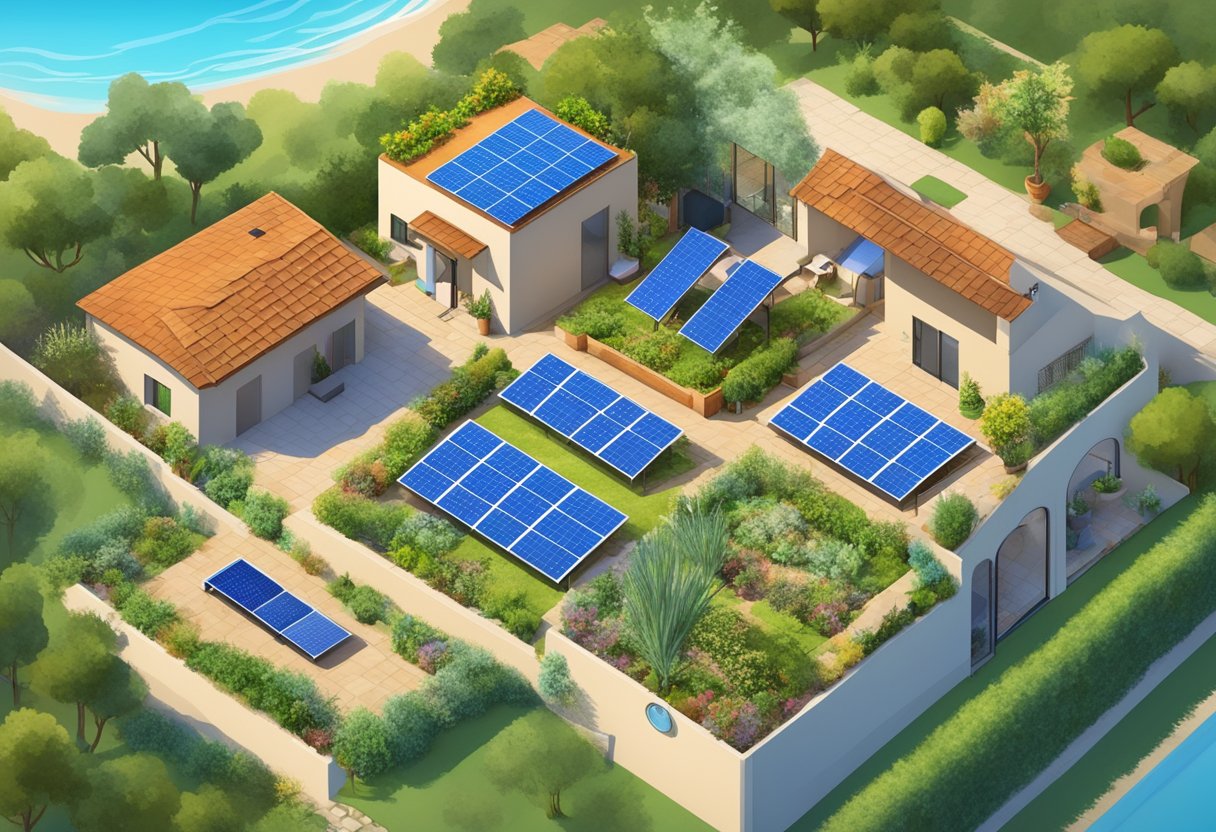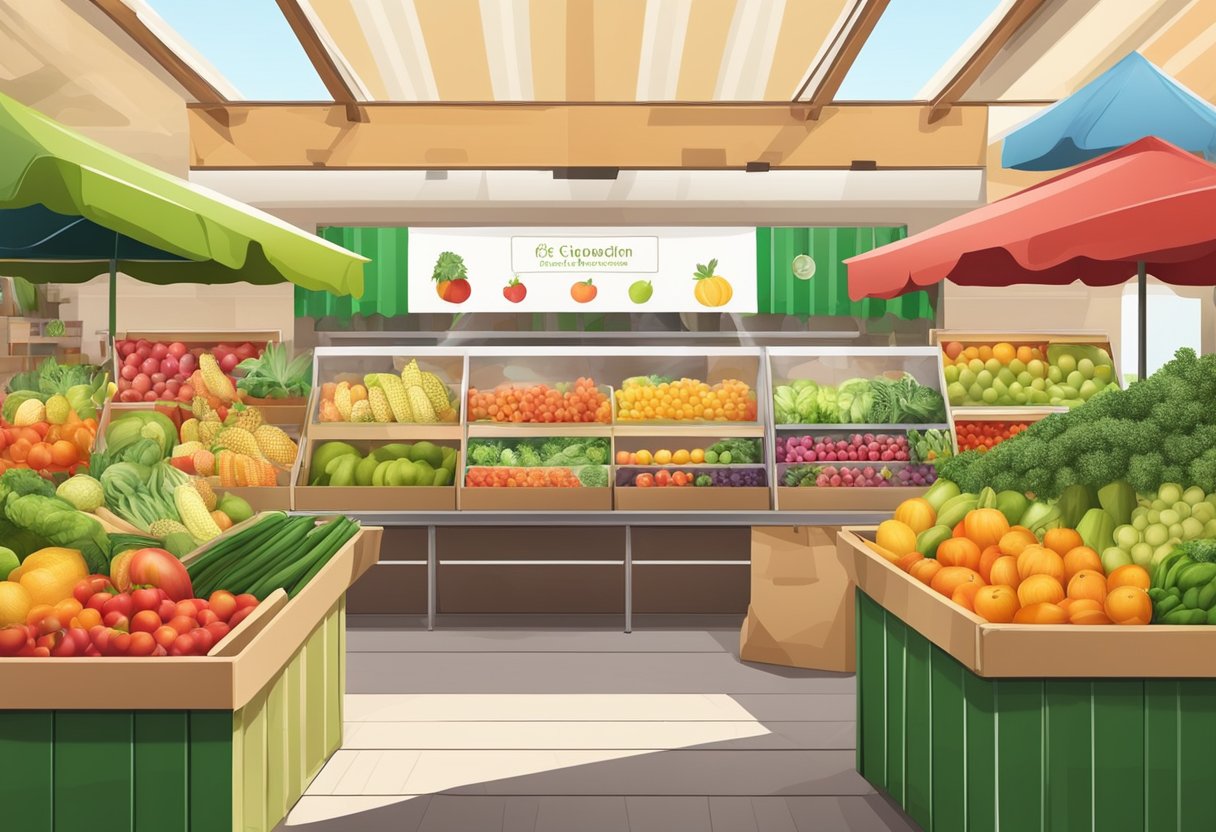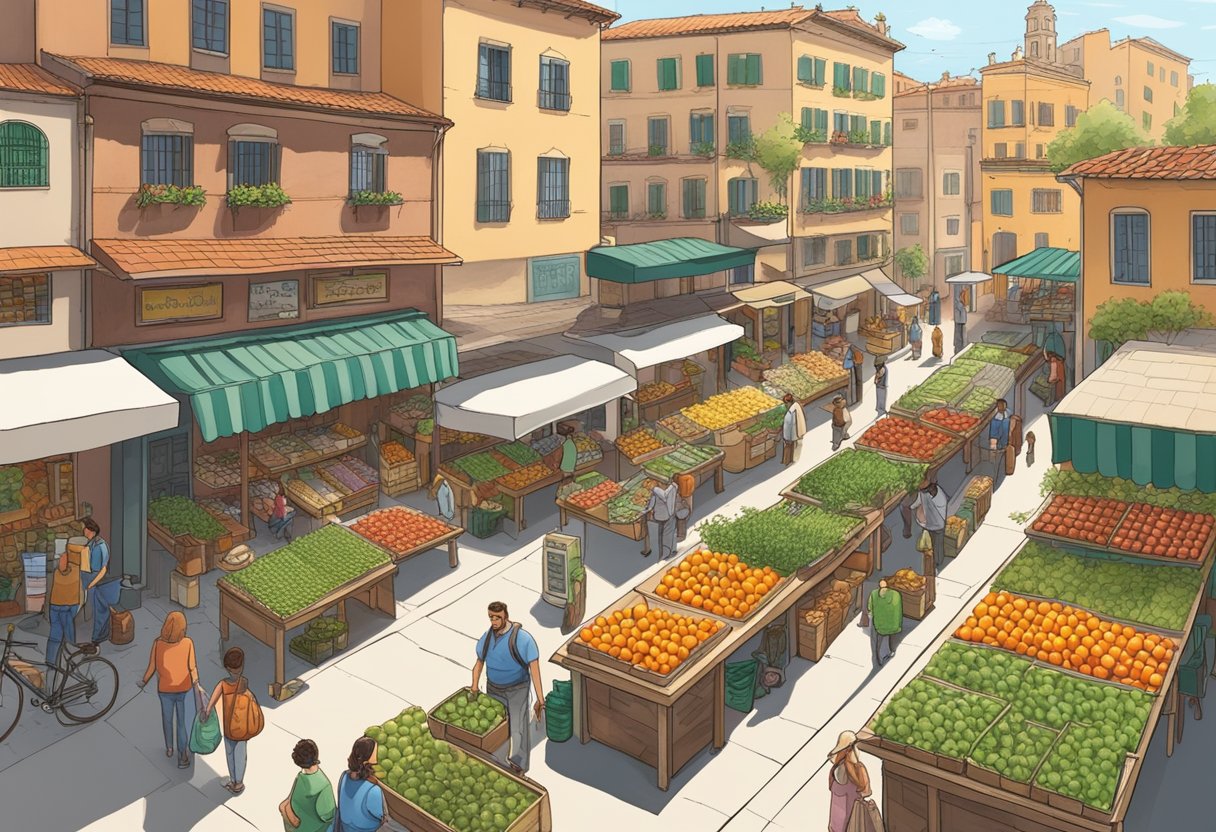Eco-friendly living encompasses a multitude of practices aimed at reducing one’s environmental impact, and in the Mediterranean, it blends seamlessly with daily life. The region’s rich history and diverse cultures have long embraced a way of living that values sustainability, from diet to resource management. Emphasis on fresh, local produce and a strong tradition of community engagement form the backbone of these practices, reinforcing the benefits of a sustainable lifestyle both for individuals and the wider environment.

In the Mediterranean, the concept of eco-friendly living extends beyond mere conservation efforts. It involves a holistic approach that includes sustainable diet and nutrition, advocating for the consumption of seasonal and regionally produced foods. This practice supports not only personal health but also reduces the carbon footprint associated with long-distance food transportation. Furthermore, there is a significant focus on sustainable household management, including water conservation and waste reduction, which are critical in an area that experiences varying degrees of water scarcity.
Key Takeaways
- Embracing local produce and traditional diets contributes to sustainability and personal well-being.
- Eco-friendly household practices in the Mediterranean are essential in managing water resources.
- Community-driven approaches play a pivotal role in preserving cultural heritage and environmental health.
Table of Contents
Fundamentals of Eco-Friendly Living

In the pursuit of a more sustainable lifestyle, individuals around the Mediterranean are adopting eco-friendly practices that conserve natural resources and protect the environment. Sustainable living isn’t just a trend; it embodies a comprehensive approach to reducing one’s carbon footprint and promoting a harmonious relationship with the Earth.
Daily Habits
- Reduce: Emphasize reducing waste, particularly when it comes to food packaging or using disposable items.
- Reuse: Opt for reusable alternatives like cloth bags and glass containers.
- Recycle: Separate recyclables to decrease garbage production and resource exploitation.
Energy Conservation
- Use LED lighting and energy-efficient appliances to cut down on electricity consumption.
- Incorporate renewable energy sources like solar panels when possible.
Eco-Friendly Diet
- Plant-based meals: Rich in nutrients and low in environmental impact, these meals align with both eco-friendly principles and the Mediterranean diet.
- Local and seasonal produce: This supports local agriculture and reduces transportation emissions.
| Food Choices | Sustainability Impact |
|---|---|
| Whole grains | Less processing, lower carbon output |
| Fresh vegetables | No packaging, supports local farmers |
| Legumes | Nutrient-rich, requires less water |
| Nuts and seeds | Sustainable source of healthy fats |
Incorporating these elements into one’s daily routine bolsters an eco-friendly lifestyle, showing that anyone can contribute to a greener future.
Sustainable Diet and Nutrition

Adopting a sustainable diet in the Mediterranean region not only supports personal health but also the health of the environment. The focus on traditionally sourced local food, plant-based options, and the structure of the Mediterranean Diet Pyramid offers a template for sustainable consumption.
Mediterranean Diet Pyramid and Nutrition
The Mediterranean Diet Pyramid emphasizes a plant-based diet rich in fruits, vegetables, whole grains, nuts, and seeds, which inherently supports gluten-free options. It highlights the nutritional benefits of a diet focused on foods traditionally consumed in Mediterranean countries. This dietary pattern is known for incorporating a wide variety of minimally processed foods and a high intake of olive oil, which is both health-promoting and eco-friendly.
Local Food and Sustainable Diets
Sustainable diets encourage the consumption of local food. This practice supports local economies and reduces the carbon footprint associated with long-distance food transport. The Mediterranean lifestyle leverages locally sourced produce, dairy, and seafood, reinforcing sustainable consumption patterns. Eating locally and seasonally is inherently aligned with a gluten-free diet, as it often involves whole, unprocessed foods.
Plant-Based Diet and Reducing Meat Consumption
A cornerstone of the Mediterranean diet is its plant-based nature, with a reduced reliance on meat which aligns with reducing environmental impact. By prioritizing vegetables, legumes, and whole grains, a gluten-free Mediterranean diet can help minimize meat consumption. This shift is not only healthy eating but also lessens the strain on natural resources and promotes biodiversity.
Sustainable Household Management

Within the realm of eco-friendly living in the Mediterranean, sustainable household management stands as a cornerstone for individuals aiming to lessen their environmental footprint. Key focuses include efficient use of energy, conservation of water, and the implementation of proficient waste and recycling processes.
Energy Consumption and Renewable Resources
Households in the Mediterranean can contribute significantly to sustainability by optimizing their energy consumption and employing renewable resources. The strategic utilization of solar panels harnesses the region’s ample sunlight, thereby reducing reliance on non-renewable power. Moreover, ensuring that appliances like dishwashers and refrigeration units have high energy efficiency ratings can lead to substantial energy savings.
Water Use and Preservation Strategies
Water use in the Mediterranean is a critical issue due to the region’s limited freshwater resources. Households can adopt preservation strategies by installing low-flow faucets and showerheads, which decrease water consumption without sacrificing performance. Additionally, reusing greywater for activities such as irrigation exemplifies a practical approach to water preservation.
Waste Management and Recycling Initiatives
Managing waste effectively is imperative for a sustainable household. Mediterranean residents can encourage recycling by separating waste into recyclables, organic matter, and landfill materials. Embracing composting can transform organic kitchen waste into nutrient-rich soil for gardens, supporting a cycle of sustainability. Furthermore, reducing packaging waste by choosing bulk options helps to minimize the overall environmental impact.
Eco-Friendly Transportation and Mobility

The Mediterranean region is increasingly embracing sustainable living choices, particularly in transportation. Eco-friendly means of transport not only reduce the environmental impact but also align with the energetic Mediterranean lifestyle that promotes health and community engagement.
Cycling and Walking as Sustainable Practices
Cycling has become a cornerstone of eco-friendly transportation within the Mediterranean. Cities are expanding bike lanes and promoting bicycle-sharing programs to encourage residents to choose this zero-emission mode of transport. Cycling enables efficient travel for short to moderate distances, significantly lowering one’s carbon footprint.
Mediterranean locales often feature compact, walkable urban designs. Encouraging residents to walk for errands or leisure capitalizes on these layouts. Walking, apart from being cost-free, further lessens traffic congestion and air pollution, aligning perfectly with the sustainable ethos of the region.
Public Transportation and Carbon Footprint Reduction
Public transportation networks in the Mediterranean are optimizing for sustainability. Electric buses and trains are increasingly commonplace, providing low-carbon travel options over longer distances. This pivotal shift assists in a major carbon footprint reduction for the region, decreasing reliance on conventional, fuel-dependent modes of transportation.
Utilizing public transport over personal vehicles can make a significant difference in environmental impact. It reduces the number of cars on the road, which translates to lower greenhouse gas emissions, and reinforces a communal approach to mobility, quintessential to Mediterranean living.
Sustainable Fashion and Consumer Choices
In the Mediterranean, sustainable fashion is becoming an essential aspect of eco-friendly living, with consumers increasingly making choices that favor eco-friendly products and packaging, and support secondhand markets and recycling textiles.
Eco-Friendly Products and Packaging
Consumers in the Mediterranean are selecting fashion items that prioritize not only the material of the clothing but also the packaging. Eco-friendly products are often packaged in biodegradable materials, reducing the reliance on harmful plastics. They are aware that sustainable packaging is just as important as the garments themselves to minimize environmental impact. Brands are responding to this demand by providing goods in recycled or plant-based plastics, ensuring that the lifecycle of their products and packaging produces a smaller carbon footprint.
Supporting Secondhand Markets and Recycling Textiles
Secondhand markets have seen a surge in popularity as Mediterranean consumers embrace the recycling of textiles. They contribute to a circular economy by purchasing pre-owned fashion items, which extends the life of garments and reduces waste. The region has seen growth in platforms dedicated to the sale of secondhand goods, making it easier for consumers to buy and sell used items. Recycling old textiles into new garments is also a practice gaining traction, with innovative companies upcycling fabrics to create fresh, fashionable pieces, reflecting a blend of traditional Mediterranean aesthetics with a modern, sustainable twist.
Community Engagement and Cultural Preservation

In the Mediterranean region, the dedication to eco-friendly living is often intertwined with efforts to sustain cultural practices and engage communities. These efforts are visible in the local initiatives that promote traditional practices in daily life while addressing environmental concerns.
Local Initiatives and Public Policies
Community-driven initiatives play a crucial role in fostering eco-friendly practices. For example, in coastal Mediterranean towns, local governments often sponsor clean-up operations to preserve the pristine nature of the beaches, which is essential to the Mediterranean lifestyle. Public policies, such as waste reduction ordinances and support for sustainable fisheries, reflect an alignment with both environmental concerns and the preservation of the local culture.
Education and Sharing Knowledge on Sustainability
Educational programs aimed at disseminating knowledge on sustainable living are instrumental in Mediterranean communities. Cooking workshops, for instance, illustrate how to create delicious gluten-free Mediterranean dishes, combining culture and lifestyle with dietary needs. By doing so, they preserve intangible cultural heritage, such as traditional recipes, while promoting healthier lifestyle choices.
Promoting Intangible Cultural Heritage and Mediterranean Lifestyle
The celebration of the Mediterranean lifestyle is evident in the vibrant marketplaces where locals can buy gluten-free ingredients native to the region, supporting both local economies and sustainable agricultural practices. Festivals centered on food, music, and dance encourage community participation and the transmission of the intangible cultural heritage that defines the Mediterranean way of life.
Global and Regional Environmental Impacts

Climate change poses a significant threat to the Mediterranean region, with projections indicating a substantial decrease in precipitation and a marked increase in temperature. Research anticipates that a 2°C global warming scenario could result in a 10 to 15% reduction in rainfall, intensifying water scarcity and affecting ecosystems. The situation becomes graver as warming trends towards 2°C to 4°C could decrease precipitation by up to 30% in Southern Europe, altering the habitat for various species and potentially leading to biodiversity loss.
The Mediterranean diet, often cited for its health benefits, also impacts greenhouse gas emissions. Adopting a Mediterranean diet which incorporates gluten-free options can reflect positively on environmental sustainability, reducing the carbon footprint linked to food production. Consumption patterns centered on plant-based, gluten-free foods typically require fewer resources and result in lower emissions compared to those dominated by meat and processed foods.
Pollution, particularly from urban waste, further stresses the Mediterranean environment. The generation of 208-760 kg of urban solid waste annually per capita underscores the urgent need for sustainable waste management solutions. The environmental footprint of waste can be mitigated through recycling and composting, practices aligned with an eco-friendly, gluten-free Mediterranean lifestyle.
Efforts to maintain environmental sustainability in the Mediterranean must also consider the preservation of local biodiversity. As urbanization expands, it puts pressure on natural habitats, necessitating measures that promote biodiversity conservation. Transitioning toward a diet focused on gluten-free, locally-sourced, and seasonal produce supports local ecosystems and reduces the demand for resource-intensive imports, thereby contributing to global sustainability efforts.
Frequently Asked Questions
The Mediterranean region is known for its rich culinary history and eco-conscious living. This section addresses some frequently asked questions related to the sustainability of the Mediterranean lifestyle and the strategies that encompass its commitment to preserving the environment.
How does the Mediterranean diet contribute to environmental sustainability?
The Mediterranean diet, often characterized by a high consumption of plant-based foods and low intake of red meat, inherently contributes to environmental sustainability. The emphasis on locally sourced and organic food reduces the carbon footprint associated with transportation and encourages practices like organic agriculture, which are more gentle on the earth and support biodiversity.
What are the key elements of the Mediterranean strategy for sustainable development?
Key elements of the Mediterranean strategy for sustainable development include promoting renewable energy use, enhancing waste management and recycling programs, conserving water, and protecting the region’s rich biodiversity. Local initiatives also focus on sustaining the natural landscapes and urban areas in a balanced manner.
What eco-friendly practices can be integrated into daily life to promote sustainability in the Mediterranean region?
Individuals in the Mediterranean can adopt eco-friendly practices like recycling and efficient waste management, utilizing public or non-motorized transport, conserving water through mindful usage, and supporting eco-tourism initiatives. These daily habits contribute to the larger goal of preserving the region’s environment.
How does the sustainability of the Mediterranean diet compare with other dietary patterns in terms of climate impact?
The sustainability of the Mediterranean diet compares favorably with other dietary patterns because of its low environmental impact. It’s known for its low greenhouse gas emissions and minimal water and land use, especially compared to diets with high meat consumption.
What measures has Italy implemented to advance its sustainable practices?
Italy, a Mediterranean country, has advanced its sustainable practices by investing in renewable energy and promoting sustainable food systems which are integral to the Mediterranean diet. Measures also include stringent regulations on waste management and initiatives to reduce food waste.
What percentage of the US food supply is wasted, and how can this issue be addressed through sustainable living practices?
In comparison to the Mediterranean model, the US sees a significant percentage of its food supply wasted. To address this issue, sustainable living practices such as composting and the promotion of food donation can be integrated into daily life, mirroring the emphasis on resource conservation seen in the Mediterranean.



